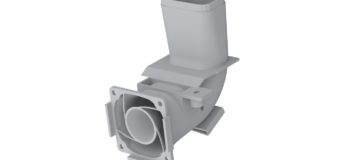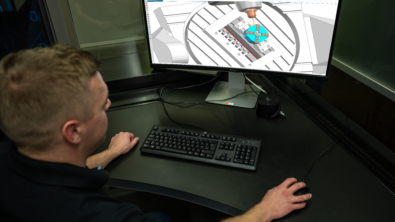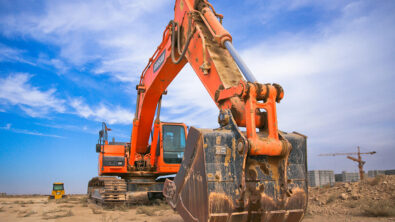Additive Manufacturing + Industrial Machinery Industry = Precision Replication

Making machines…
Anyone who knows me knows that I am a certified card-carrying geek. I watch a decent amount of television, but my small screen world is devoid of crazy housewives, idols, and dancing with celebrities I’ve never heard of. I prefer shows like How It’s Made on the Science Channel. I can watch products being put together for hours on end because the sheer variety of processes and assembly steps those everyday products go through never ceases to amaze me. Like I said… Geek.
Anyway, if you have never seen the show, it takes a product and gives you the shorthand version of how the product is manufactured. From fire extinguishers to john boats, ice skates to prepackaged pastries, you get to see the highlights of the process that brings those goods to your local store and then into your home. You can watch as machines fold, attach, transport, bake, cool, trim, etch, and assemble a multitude of products that are sent across the globe every day.
Industrial machinery is simply a triumph of modern ingenuity, and at Siemens, we are working to help bring machinery into the 21st century with additive manufacturing (AM) technology.
Printing Printers…
Over the past few years, we have worked extensively with our partner HP. HP’s entry into the 3D printing world made big news back in 2016. Since then, their machines and technology have evolved into one of the best ways for printing usable production plastic parts.
 A 3D printed duct from inside the HP 3200 and 4200 series printers. (Part courtesy HP)
A 3D printed duct from inside the HP 3200 and 4200 series printers. (Part courtesy HP)
If you are familiar with the RepRap series of desktop printers, one of their basic tenants is that parts for new printers can be printed using existing printers. So, while the concept of a self-replicating machine is not new, what is interesting about the HP machines is that from the very beginning they designed their machines with the concept of using printers to print parts for new printers. There may be others, but this is the first time I know of that a major manufacturer has used this concept to print parts for their own printers on such an industrial scale. In fact, one of the parts that we routinely use for demonstrations is a duct from inside of the HP 3200 and 4200 series printers that is printed on a 4200 series printer.
Custom is King…
One other interesting thing I’ve found from watching shows like How It’s Made is how many machines there are that are custom built for a specific purpose. For example, a machine that wraps thousands of pieces of bubble gum in a minute cannot be used to fold sheet metal covers for electrical panels. Many industrial machines are truly custom pieces of equipment that are designed specifically for fulfilling a specific purpose in a manufacturing process for a particular product.
 A model of a large multi-stage machine.This type of customization is one area where additive manufacturing can excel. 3D printing can be used to create parts for custom industrial machines where tooling, casting, and other standard manufacturing methods might be too expensive for such a low volume of parts or have protracted lead times that are unacceptable.
A model of a large multi-stage machine.This type of customization is one area where additive manufacturing can excel. 3D printing can be used to create parts for custom industrial machines where tooling, casting, and other standard manufacturing methods might be too expensive for such a low volume of parts or have protracted lead times that are unacceptable.
Creating small volume parts for machines using additive manufacturing technology is something that we expect to see more and more of as the AM industry matures. Industrial machinery seems like an excellent use case for custom parts such as these.
A Beautiful Machine…
To be honest, I find beauty in machinery. The order, the ingenuity, the sheer variety of mechanical mechanisms, I love it all.However, from what I can see, the industrial machinery industry is ripe for some disruption by additive manufacturing. We have printers printing printers and the custom nature of many industrial machines, not to mention other use cases I have not mentioned, such as on-demand printing of repair parts, or using lattice structures to stop failure propagation in parts used in heavy vibration environments. With these use cases and more, there are a multitude of ways that additive manufacturing can be applied to industrial machinery uses.
At Siemens, we recognize that industrial machinery makes our modern world possible and our goal is to industrialize additive manufacturing so that new machines with 3D printed parts can bring the products you and I rely on to our doorsteps for years to come.
This is the last in a series of posts about additive manufacturing in industry. Other posts in the series can be found at the links below.
I would love to hear what you have thought of my small series of additive manufacturing in industry posts. If they have been interesting, useful, or informative, I will consider doing another series in the future. Please let me know what you think in the comments below.
Ashley Eckhoff has a background in engineering and has been with Siemens for over 20 years in various capacities. He has spent the last few years deep-diving into additive manufacturing in both product design and marketing roles.


![Siemens NX CAM software powers precision in electric vehicle part manufacturing [article]](https://blogs.stage.sw.siemens.com/wp-content/uploads/sites/15/2024/04/American-Machinist-1-395x222.png)